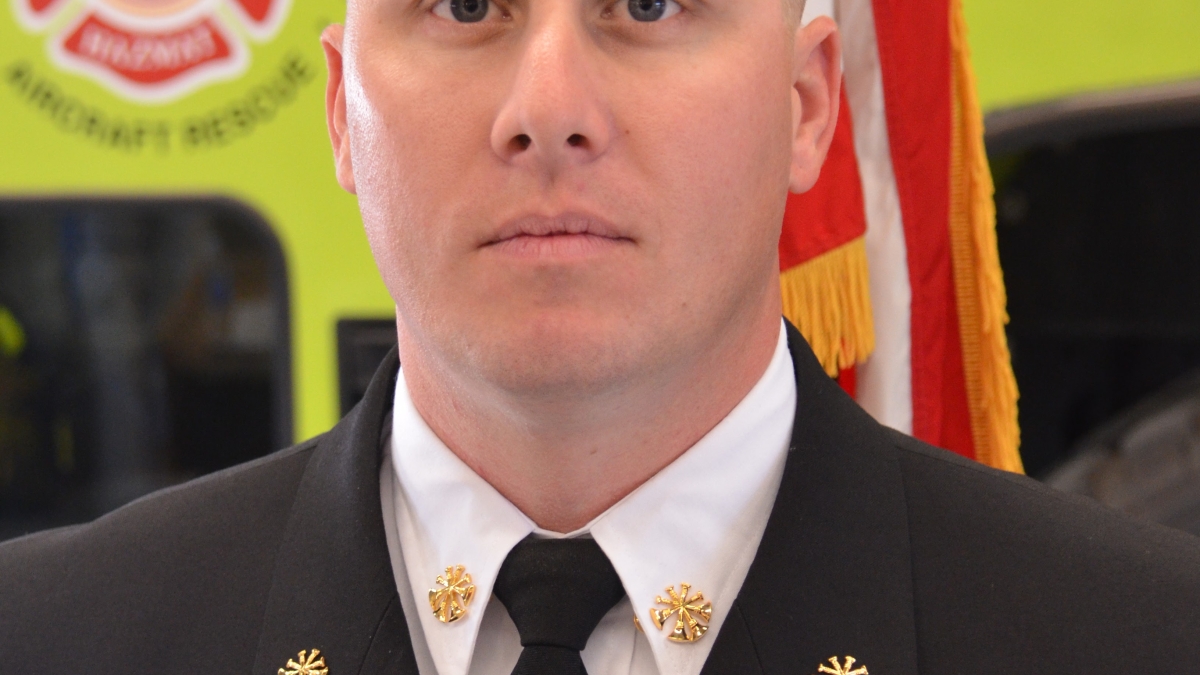From senior master sergeant to master's degree, grad sees value of access to education

Joshua Loescher.
Editor’s note: This is part of a series of profiles for spring 2019 commencement.
Senior Master Sgt. Joshua Loescher takes to heart the universal truth that education is a great equalizer. He has seen it in action during his military career in places like Baghdad. He is also living proof.
“I’ve been able to go to other places in the world and see different things,” Loescher said. “Not all of it is good.”
But it can be better. Loescher firmly believes that.
“I am passionate about equity of opportunity and the role that education plays in that,” said Loescher, a Wisconsin Air National Guard fire chief. “Having witnessed the manifestation of the globalization of education and the equity in opportunity it provided me and others across the globe, I can’t help but be enamored by it.”
Loescher, who is graduating from Arizona State University with a master’s degree in public safety leadership and administration, is the spring 2019 outstanding interdisciplinary graduate for Watts College of Public Service and Community Solutions.
Loescher’s appreciation of access to education as a universal phenomenon grew when he saw how Iraqis and others struggled to learn what American military firefighters were assigned to teach.
“They don’t know what they don’t know,” Loescher said. “The reason they were not very good at the job is because they didn’t have the opportunity to be good. They didn’t have the training. … These people aren’t inherently lazy. They inherently don’t have opportunity.”
Loescher could relate on a personal level. College opportunities were limited for a kid from rural Wisconsin with a high school academic record that was “less than stellar.” Online degree programs opened up a new world of possibilities for Loescher.
“You can find a bajillion statistics out there about how people that have attained bachelor’s degrees and master’s degrees are smarter, healthier, they make more money, and they have a general overall better quality of life,” Loescher said.
“I made the choice to enlist in the military. I didn’t think it was right, that because I made a choice to go into the military as opposed to going to college, that I should have less opportunity than somebody else.”
Online degree programs offer opportunities “to do exactly what you want to do and when you want to do it,” Loescher said.
In 2017, Loescher earned his bachelor’s degree in fire science from American Military University, an online learning institution. He took just a few months off and then dived into the Watts College online master’s degree program.
Loescher credits ASU’s proactive approach to making college accessible for helping him become more of who he wants to be as a professional and a person. He said the master’s degree gives him a more complete understanding of how to manage an organization, which he believes will help him be a better fire chief and leader.
His capstone project already has the attention of high command. As part of his program, Loescher analyzed a major challenge of the dual federal and state budget processes that finance National Guard installations. National Guard units belong to states, but each installation’s base, buildings and equipment are owned by the federal government. The federal government pays states to fund National Guard firefighters.
The Air National Guard is interested in knowing the impact of converting firefighters from being federally funded employees to simply federal employees. Loescher provided some answers.
For each Air National Guard fire department, Loescher assessed costs and variables over five years. He then analyzed the leadership impacts from introducing such a major institutional change. His work is making its way up the Air National Guard chain of command, providing insight that could yield greater efficiencies in fire service administration and operations.
Loescher, who has three deployments and has earned 19 decorations during his military career, expects to apply what he has learned at ASU in service to others. Some ideas for the future include teaching at the college level and perhaps one more deployment, where he hopes to repeat making a positive difference training military firefighters.
But the overall goal for Loescher, a proud husband and father to three sons, is to continue to be someone who leads by “positive example of kindness, compassion, inclusion and understanding.”
“If you’re going to use your position to your advantage, you should use it because you know there’s a bunch of people watching you,” he said. “If you just do the things you’re supposed to do and you’re nice to people and you work hard, then that will tell people who are watching you that, ‘It worked out for that guy. Look at him; he’s a fire chief. If it worked for him, it will probably work out for me, too.’”
Story by Jennifer Dokes
More Arts, humanities and education

Honoring innovative practices, impact in the field of American Indian studies
American Indian Studies at Arizona State University will host a panel event to celebrate the release of “From the Skin,” a…

ASU alum's humanities background led to fulfilling job with the governor's office
As a student, Arizona State University alumna Sambo Dul was a triple major in Spanish, political science and economics. After…

ASU English professor directs new Native play 'Antíkoni'
Over the last three years, Madeline Sayet toured the United States to tell her story in the autobiographical solo-…